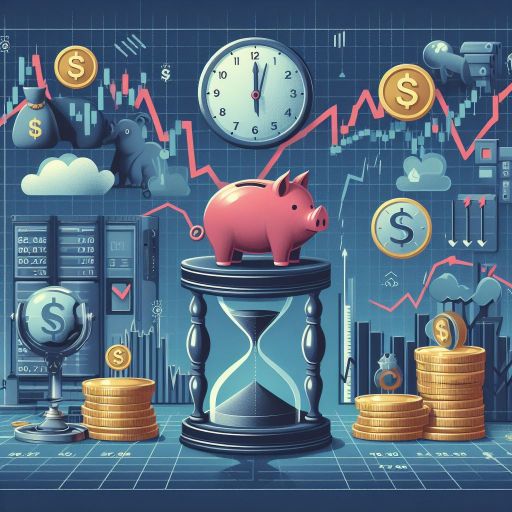7 Ways Interest Rates Affect the Stock Market
The delicate give-and-take relationship between interest rates and the stock market is analogous to a difficult dance in which each movement by one dancer affects the motion of another in complex ways.
Changing interest rates can be exploited by central banks as a very powerful tool for influencing economic activity, with countless repercussions all through the stock market.
How Interest Rates and the Stock Market Are Related
The process of determining interest rates has significant implications for the stock markets.
When companies experience decreased growth or reduced profitability attributed to factors such as increased debt expenses or decreased revenues, their anticipated future cash flows also decline.
Therefore, other things being equal, a fall in the company’s stock price is expected.
This has an effect on the broader market if enough companies suffer declines in their share prices. This includes key indices like the Dow Jones Industrial Average and the S&P 500, among others.
Decreased growth prospects and future cash flows lead to weak increases in stock prices, thus reducing the attractiveness of equities. Furthermore, it may also be possible that stocks look too dangerous versus other investment alternatives given the situation.
However, there are areas that can gain from the hike in interest rates, such as the financial industry.
Financial institutions benefit from higher interest rates, resulting in increased profits for banks, mortgage companies, brokerages, and insurance firms since they can charge a higher rate of interest on loans.
Investigating this dynamic relationship deeper shows us how interest rates affect the stock market in seven main ways.

Borrowing costs for companies
The ebb and flow of interest rates have direct effects on the borrowing costs companies incur. High interest charges make it more expensive for businesses to loan money or take a line of credit, which lowers their profit margin.
This can cause an increase in borrowing costs in stock markets, leading to a decrease in share prices. Conversely, when borrowing costs fall due to a decrease in interest rates, there is potential for company profits to rise and an increase in stock values too.
Consumer Spending
Consumer spending is seen to be influenced by interest rates. On the other hand, high interest rates will imply that consumers have to pay more for their loans and credit cards, limiting their disposable incomes meant for discretionary spending.
Thus, this decrease in consumer expenditure may have detrimental impacts on corporate sales and share values. Alternatively, lower borrowing costs might entice people to spend more, thereby boosting companies’ top lines and stock prices.
Investment Decisions
Investors often change their investment mix between equities and bonds depending on the current interest rates. Yields on fixed-income securities such as bonds usually increase when interest rates rise.
As a result, people shift away from shares towards fixed-income assets with higher coupon payments.
Conversely, stocks become relatively attractive as compared to other forms of investment in cases where there are no lucrative opportunities in the bond market. The result is an increased volume of investments in stock markets.

Stock Valuation
Stocks are valued, especially in the discounted cash flow model, by interest rates. An increase in the rates of interest leads to a greater discount rate, which can lower the PV of future earnings and therefore reduce stock attraction.
However, reduced interest rates increase the worth of stocks due to a reduction in the discount rate, resulting in an enhanced present value for future earnings.
Sectoral-specific impacts
Different areas within the stock market respond differently to fluctuations in interest rates. A case example is financial institutions, which may gain from rising interest rates as they would be able to realize more revenue from their credit facilities.
Conversely, sectors like real estate and utilities, which often have large amounts of debt, may suffer due to increased interest costs, eventually triggering declines in their share prices.
Currency Strength
The strength of a nation’s currency is influenced by interest rates. When interest rates are high, foreign investors come to the country in search of higher returns, and consequently, these actions strengthen the country’s exchange rate.
Nevertheless, strong currencies can lead to expensive exports, thereby affecting companies that depend on international sales and their stock prices.
Economic Growth
Interest rates act as key determinants of economic growth paths. This could, however, dampen economic activity, leading to reduced corporate earnings and bearishness within the stock market.
Conversely, low interest rates can spur economic expansion, resulting in increased corporate profits and bullish market sentiment, respectively.
The Effects of Changing Interest Rates on Stocks
When interest rates increase, the Federal Reserve has the objective of cooling down an economy that is too hot by making credit more expensive and difficult to access.
During such periods, however, certain sectors might experience potential growth, such as consumer goods, basic lifestyle products, and industrial goods, among others.
In the same vein, firms not dependent on cheap borrowing for expansion may witness a rise in their stock prices because they do not need costly external financing.
On the other hand, growth stocks that hinge too much on capital for their expansion will have some difficulties because high discounting lowers their discounted cash flows, and obtaining low-priced borrowings becomes even harder due to rising interest rates.

What is the Best Place to Invest When Interest Rates Are Increasing?
When rates are on the rise, it is important to know what type of investment is best. This involves a nuanced reading of developments in the economy.
Though there isn’t one all-purpose investment that performs great all the time, certain asset classes often show resilience during such times. As an example, short-term bonds reduce exposure linked to longer-term rate commitments.
Conclusion
Investors have to understand how interest rates and stock markets relate differently.
Consequently, by vigilantly following central bank policies and observing current interest rate movements, investors can make good decisions when investing wisely in this changing market, which will help them manage their portfolio well within this dynamic stock market.
Thus, for individualized investment advice based on your financial objectives and specific circumstances, consult with a competent financial planner.
OTHER NEWS
-
- Top Accredited Online Colleges You Should Consider
- By Prodosh Kundu 02 Sep,2024

-
- If you had Enough Money, Which Country Would you buy a House in?
- By Little Grapes 24 Apr,2023

-
- The Pros and Cons of Personal Loans and how to get one
- By Little Grapes 24 Apr,2023

-
- Who is the Primary Lender When Applying for a Home Loan? These Points are Important!
- By Little Grapes 24 Apr,2023

-
- The 4 Stages in the Forex Market That Traders Should Be Aware of
- By Prodosh Kundu 15 May,2024

-
- No Need to Worry About Buying a Home in the US, you Just Need to Know These Steps!
- By Anna 24 Apr,2023

-
- The Importance of Buying Auto Insurance!
- By Little Grapes 24 Apr,2023

-
- How to Successfully Negotiate a Real Estate Commission and Save Money?
- By Wendy 24 Apr,2023

-
- The Power of Loans: Empowering Your Financial Journey
- By Little Grapes 07 Aug,2023

-
- Top Credit Cards for Students: Rewards and Building Credit History.
- By Wendy 24 Apr,2023

-
- How to Choose the Right Savings Account for Your Needs
- By Prodosh Kundu 07 Aug,2024

-
- Strategies to Truly Hassle-Free Passive Real Estate Income
- By Kevin Mathenge 24 Apr,2024

 1
1 1
1